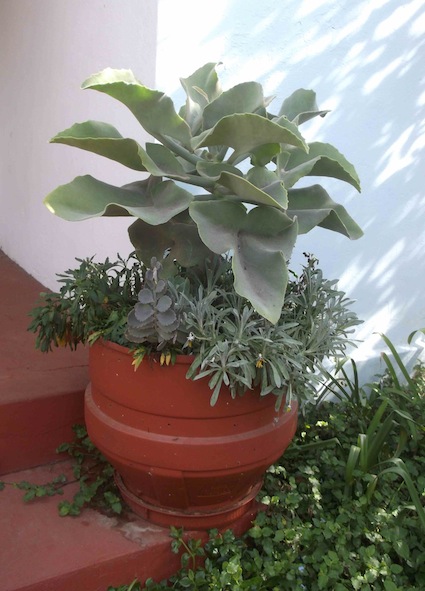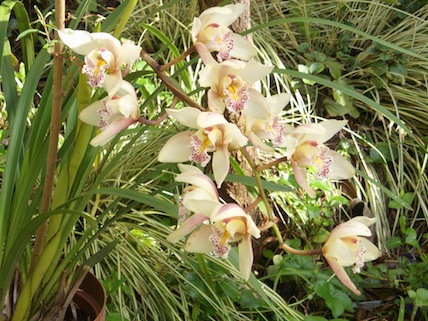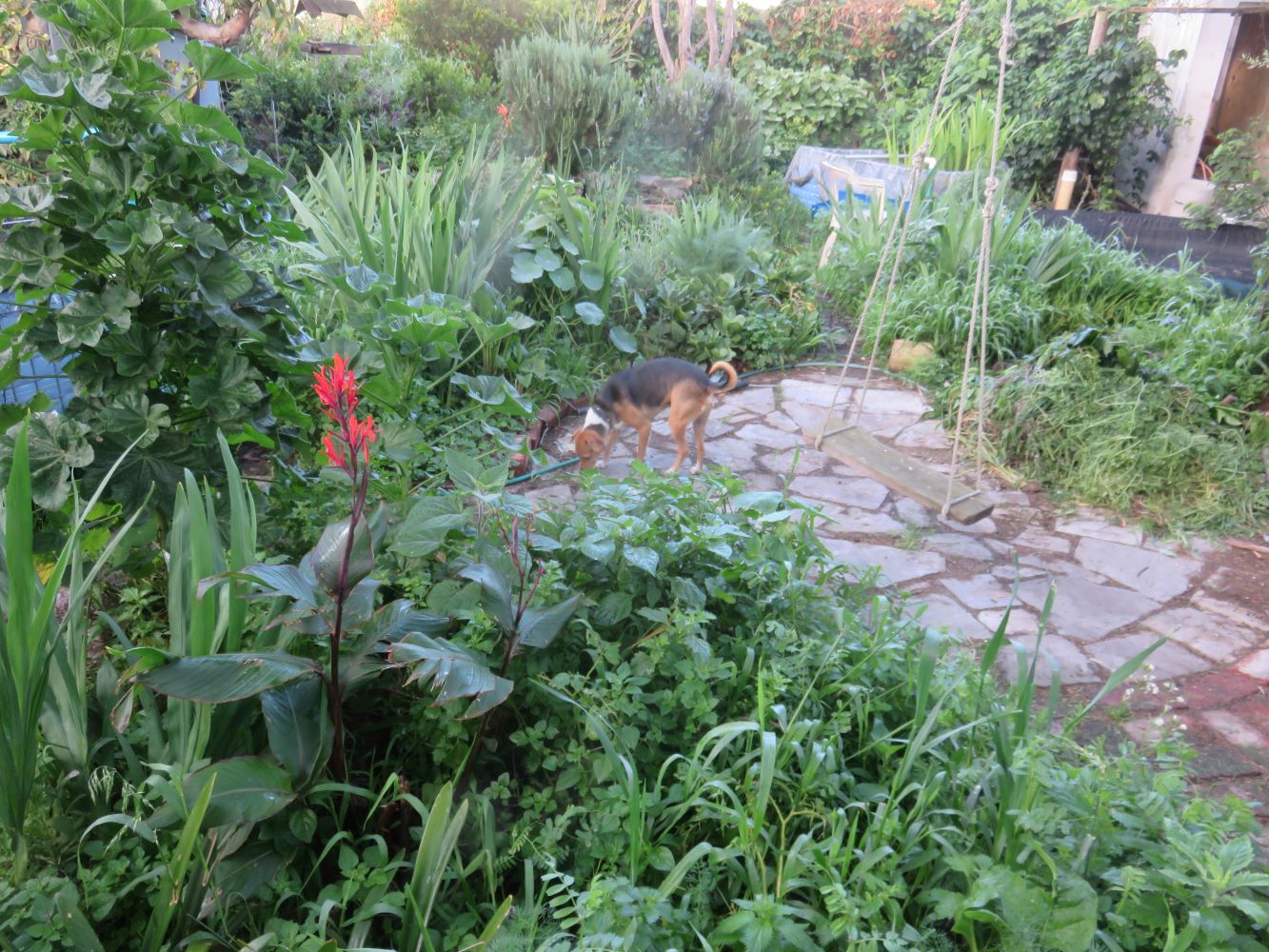Dear Reader, in this age of AI created content, please support with your goodwill someone who works harder to provide the human-made. Sign up in the righthand column or bottom of this page. You will receive my hand illustrated monthly newsletter RESTORE NATURE and access to the biodiversity garden design course as I write...and nothing else, I respect your time.
flower garden tips for easier planning
There are two flower garden tips I will touch on here, firstly growing your flowers in pots, and secondly observation of your
environment, which is where you can start, if you want flowers all year.
Here is the first of the flower garden tips
Plant your flower garden in containers
One of the great flower garden tips, is to plant your flower bearing plants in pots. There are many advantages to this, and some disadvantages.
A flower pot can be portable
The advantages are that you can move pots around. Therefore, you can plant up the flowering plant, long before the flowering season, and keep it in the garden in a less

visible position while it grows to maturity, and move it to a more prominent position when it flowers. Thus all year round, you can have pots with flowers bursting from them, in your patio garden, or decorating the area closer to the house, or on your front porch, for example. Here it is obviously important to know your limits and choose a pot size that you can lift easily. Something to think about. In my previous home I built a huge brick planter, and I couldn't lift it, but it was a joy to behold, bursting with succulents and crowned by a twisted Frangipani tree.


the same pot almost a year later, there are even flowers in the middle of winter !
A plant in a pot can be forced to flower
My mum (86) has lots of gardening experience growing bizzie lizzies, also known as Impatiens walleriana, or just Impatiens, balsam or sultana and Pelargoniums, of which she has a huge collection, this country being the origin of the garden plant, and thus a center of diversity. She always grows them in pots because she says as they become slightly root bound, they flower better. It makes sense in terms of cycles of vegetative and sexual growth. A plant in the soil can grow and keep on growing, and if it is a good vegetative reproducer (as is Impatiens, rooting very easily) it will adopt that strategy, expand its mass of stalks and leaves. Confine it to a pot, and it too becomes aware of its limitations, and changes its reproductive strategy to the sexual, bursting into flower. There are limits in applying anthropomorphy to the bizzie lizzie too, let me move on. Witness to this success are the flowering windowboxes of the world, the flowering plants you buy in the nursery which caught your eye, and then never flower again in such splendor once planted in the garden. The disadvantage to planting in pots is that the plant will flower as it reaches its
limits, requiring transplanting soon after, to prevent it slowly starving and becoming sickly. Furthermore, flowering ‘ages’ the plant’s tissues (see Jim Gardener) and you will need to replace the plant with a freshly grown new one soon, if it is a plant with a limited age, like an annual. Planted out in the garden, the plant will go on flowering for much longer if it is a perennial, but it will perhaps flower less, depending on the species.
A plant in a pot has more controlled growth conditions
There is another old lady, the mother of an acquaintance, who is a horticultural professional and never plants standard roses out in the garden, but only grows them in pots, because her farm is on sand. You can enrich the soil in a pot with much more control than in the ground, adding clay, nutrients, humus and so forth. You can protect it to a greater degree from root pests in your garden, insects, fungus, and moles, if it is vulnerable. You can change the growing environment by moving the plant into the sun, the shade, or out of the wind. However, this very confinement, that allows control, also requires greater care from you, because a pot will dry out more quickly than soil, as water is drawn through the tiny pores in the soil, by capillary forces, to equalize the moisture in your garden. You will need to pay frequent attention to the moisture levels in the pot, the smaller it is, the more frequent. Confinement also causes all added chemicals to have a more intense effect, and you need to be more careful when fertilizing and applying pest control. One solution (and it really is a ‘solution’ is to apply worm tea. Its nutritional content is
balanced, slow releasing, and it contains natural fungicides and has an insect repelling property). This would be the ‘green’ way to go. Adding petrochemical and mining derivatives to your garden has so many side effects, such as ground water pollution (see the section on eco water). You cannot overfeed and you cannot burn your plant’s roots with worm tea. Many people swear by nutrition with worm tea for ferns, orchids, flowers and herbs.
------
------
------
flower garden tip feed with worm tea
------
flower garden tip 2: have fun observing your environment
------
vegetable gardening the natural low cost way
------
flower garden tips, green management at Irma Stern Museum
Restore Nature Newsletter
I've been writing for four years now and I would love to hear from you
Please let me know if you have any questions, comments or stories to share on gardening, permaculture, regenerative agriculture, food forests, natural gardening, do nothing gardening, observations about pests and diseases, foraging, dealing with and using weeds constructively, composting and going offgrid.
You’re a home gardener ! Share your experiences and questions !
We all know about home gardening. Tell us about your successes, challenges and ask about issues that bother you. You may have the luxury of a back garden, but there are other ways we learn. Few people age without growing something or buying vegetables during their lives ! It is absolutely guaranteed that you have learned things which can help others on their gardening journey.
We invite you to share your stories, ask questions, because if a thing has bothered you it will bother others too. Someone may have a solution ! No question is too small. There is learning for everyone involved, for you, for me (yes, I learn from every question), for us all. Exciting stuff !
We are starting on a new journey. Every week we will profile your letters ! The best stories and questions we receive.
SEARCH
Order the Kindle E-book for the SPECIAL PRICE of only
Prices valid till 30.09.2023
Recent Articles
-
garden for life is a blog about saving the earth one garden at a time
Apr 18, 25 01:18 PM
The garden for life blog has short articles on gardening for biodiversity with native plants and regenerating soil for climate amelioration and nutritious food -
Cape Flats Sand Fynbos, Cape Town's most endangered native vegetation!
Apr 18, 25 10:36 AM
Cape Flats Sand Fynbos, a vegetation type found in the super diverse Cape Fynbos region is threatened by Cape Town's urban development and invasive alien plants -
Geography Research Task
Jan 31, 25 11:37 PM
To whom it may concern My name is Tanyaradzwa Madziwa and I am a matric student at Springfield Convent School. As part of our geography syllabus for this
"How to start a profitable worm business on a shoestring budget
Order a printed copy from "Amazon" at the SPECIAL PRICE of only
or a digital version from the "Kindle" store at the SPECIAL PRICE of only
Prices valid till 30.09.2023








